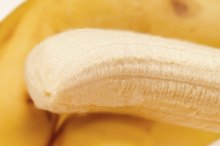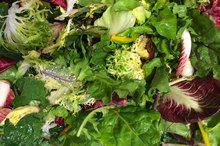Can You Get Potassium Poisoning From Bananas?
Bananas are one of the best sources of dietary potassium. A large banana provides 487 mg of this mineral, according to the U.S. Department of Agriculture National Nutrient Database. Because your daily requirement for potassium is 4,700 mg, you could exceed this limit by consuming fewer than 10 large bananas in a single day. However, potassium poisoning from eating bananas is unlikely if you are in good health. Consult a dietitian or your health care provider with concerns about your potassium intake.
Banana Nutrition
Bananas give your diet energy-rich starch and sugars, a very small amount of protein and almost no fat. Although the predominant mineral in bananas is potassium, the fruit also contains low levels of magnesium, zinc and iron. In addition, bananas supply vitamins C and B-6. Only a few food sources offer more potassium to your nutrition plan than bananas, and these include potatoes, prunes and prune juice, raisins, lima beans and acorn squash.
- Bananas give your diet energy-rich starch and sugars, a very small amount of protein and almost no fat.
- Only a few food sources offer more potassium to your nutrition plan than bananas, and these include potatoes, prunes and prune juice, raisins, lima beans and acorn squash.
Potassium Function
Foods With Potassium Bicarbonate
Learn More
Potassium serves as an electrolyte, a charged ion that helps to provide the electrical signals that your cells need to function. Potassium is a positively-charged ion that resides in high concentrations inside your cells. It works in concert with sodium ions located outside your cells to create an electrochemical gradient between the interior and exterior of the cell membrane. This so-called membrane potential helps to power your cells for muscle contraction, nerve transmission and maintaining your heartbeat. Potassium also functions as a cofactor for enzymes, such as those involved in carbohydrate metabolism. Although potassium toxicity from eating bananas is unlikely, certain medical conditions may lead to dangerously high serum levels if you consume excess potassium.
- Potassium serves as an electrolyte, a charged ion that helps to provide the electrical signals that your cells need to function.
- It works in concert with sodium ions located outside your cells to create an electrochemical gradient between the interior and exterior of the cell membrane.
Potassium Toxicity
Hyperkalemia is a condition in which your blood contains elevated levels of potassium. It results from taking in more potassium than your kidneys can excrete, and might be due to kidney disease, overuse of diuretics or a hormone imbalance that affects your kidneys. Symptoms include muscle weakness, tingling of your extremities, temporary paralysis and, in severe cases, an irregular heartbeat that can lead to heart attack. The Linus Pauling Institute of Oregon State University advises there is no established safe upper limit for potassium intake; however, they report an oral dose of at least 18 g results in hyperkalemia in healthy adults. This dose is the equivalent of consuming 37 large bananas at once, making it improbable that you could eat enough bananas to induce toxicity.
- Hyperkalemia is a condition in which your blood contains elevated levels of potassium.
- It results from taking in more potassium than your kidneys can excrete, and might be due to kidney disease, overuse of diuretics or a hormone imbalance that affects your kidneys.
Considerations
What Is the Potassium Content in a Banana?
Learn More
Potassium supplements, even if they do not lead to hyperkalemia, may cause gastrointestinal distress, with symptoms including abdominal pain, vomiting and diarrhea. Taking supplements with meals may mitigate these problems. However, fresh foods such as bananas and potatoes supply sufficient dietary potassium to render supplements unnecessary.
Related Articles
References
- Oregon State University Linus Pauling Institute; Potassium; December 2010
- Potassium. Office of Dietary Supplements. National Institutes of Health
- Lambert H, Frassetto L, Moore JB, et al. The effect of supplementation with alkaline potassium salts on bone metabolism: a meta-analysis. Osteoporos Int. 2015;26(4):1311-8. doi:+10.1007/s00198-014-3006-9
- Chatterjee R, Slentz C, Davenport CA, et al. Effects of potassium supplements on glucose metabolism in African Americans with prediabetes: a pilot trial. Am J Clin Nutr. 2017;106(6):1431-1438. doi:10.3945/ajcn.117.161570
- Potassium. Fact Sheet for Consumers. Office of Dietary Supplements. National Institutes of Health
- Health Claim Notification for Potassium Containing Foods. US Food and Drug Administration
- Aburto NJ, Hanson S, Gutierrez H, Hooper L, Elliott P, Cappuccio FP. Effect of increased potassium intake on cardiovascular risk factors and disease: systematic review and meta-analyses. BMJ 2013;346:f1378.
- Academy of Nutrition and Dietetics. What Is Potassium?
- ConsumerLab.com. Potassium Supplements Review.
- Curhan GC, Willett WC, Rimm EB, Stampfer MJ. A prospective study of dietary calcium and other nutrients and the risk of symptomatic kidney stones. N Engl J Med 1993;328:833-8.
- Curhan GC, Willett WC, Speizer FE, Spiegelman D, Stampfer MJ. Comparison of dietary calcium with supplemental calcium and other nutrients as factors affecting the risk for kidney stones in women. Ann Intern Med 1997;126:497-504.
- D’Elia L, Barba G, Cappuccio FP, Strazzullo P. Potassium intake, stroke, and cardiovascular disease a meta-analysis of prospective studies. J Am Coll Cardiol 2011;57:1210-9.
- O’Neil C, Keast D, Fulgoni V, and Nicklas T. Food sources of energy and nutrients among adults in the US: NHANES 2003-2006. Nutrients. 2012;4:2097-120. DOI: 10.3390/nu4122097.
- Stone M, Martyn L, and Weaver C. Potassium intake, bioavailability, hypertension, and glucose control. Nutrients. 2016;8: E444. DOI: 10.3390/nu8070444.
- U.S. Food and Drug Administration. Health Claim Notification for Potassium Containing Foods.
- Weaver CM. Potassium and health. Adv Nutr 2013;4:368S-77S.
- Yong Sun, et al. Dietary potassium regulates vascular calcification and arterial stiffness. JCI Insight. 2017;2(19):e94920.
Writer Bio
A writer since 1985, Jan Annigan is published in "Plant Physiology," "Proceedings of the National Academy of Sciences," "Journal of Biological Chemistry" and on various websites. She holds a sports medicine and human performance certificate from the University of Washington, as well as a Bachelor of Science in animal sciences from Purdue University.









